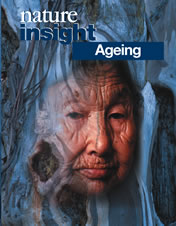Ageing
Vol.
408, No. 6809 (9 November 2000).
|![]() PDF
PDF![]() (287
(287![]() K)
K)![]() |
|
 |
Cover
illustration |
Evolutionary history has determined that individuals thrive for long enough to produce and nurture their offspring.
Thereafter, the ageing process involves a slow decline in physiological vigour and an increasing susceptibility to age-related disease. Much of human culture and thinking has been shaped by the inevitability of our ageing and death.
The current scientific picture of ageing presents us with an intriguing jigsaw puzzle. We know, for example, that reducing food intake can slow the ageing process, at least in lower animals such as nematode worms. We know that telomeres, which protect the ends of chromosomes, erode as our cells age. But how can we connect together these and other discoveries to give a meaningful picture of the genetic and biochemical processes that underlie ageing? With this goal in mind we have assembled a collection of review articles which rehearse our current understanding of the ageing process from several distinct vantage points.
Why do humans age, when fairly similar creatures (such as turtles) apparently do not? Individual articles discuss the conundrum of ageing from an evolutionary standpoint, the role that oxidative damage plays in the ageing process and the ways in which age-related cancer may develop. Recent research on ageing in model organisms is then reviewed, followed by progress in understanding human 'progeroid' syndromes, in which elements of the normal ageing programme are accelerated owing to genetic abnormalities. Finally, we ponder the future prospects for research on ageing, and what implications the fruits of this research may have for our society.
Although some readers may feel that they are already more familiar with the ageing process than they might wish to be, we hope that this collection of reviews will nonetheless prove stimulating and informative.
Bernd
Pulverer Associate Editor
Richard Turner Senior Editor
| Why
do we age? THOMAS B. L. KIRKWOOD AND STEVEN N. AUSTAD
| 233 | ||
| Oxidants,
oxidative stress and the biology of ageing TOREN FINKEL AND NIKKI J. HOLBROOK
| 239 | ||
| The
age of cancer RONALD A. DEPINHO
| 248 | ||
| Genetic
pathways that regulate ageing in model organisms LEONARD GUARENTE AND CYNTHIA KENYON
| 255 | ||
| Lessons
from human progeroid syndromes GEORGE M. MARTIN AND JUNKO OSHIMA
| 263 | ||
| The
future of ageing LEONARD HAYFLICK
| 267 | ||
